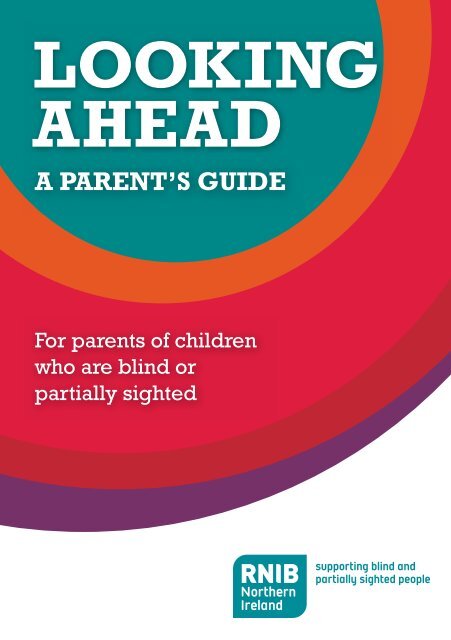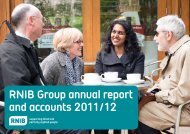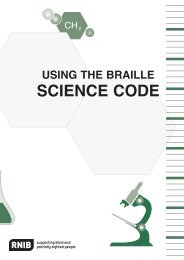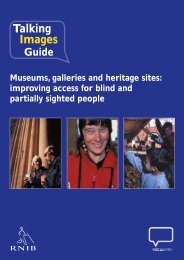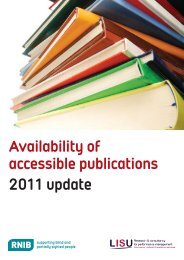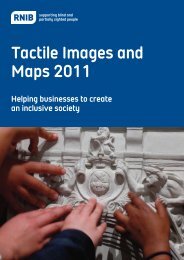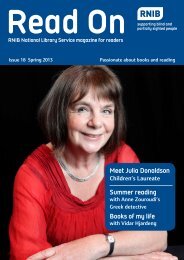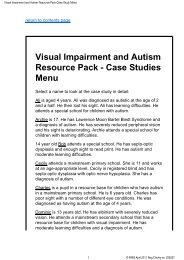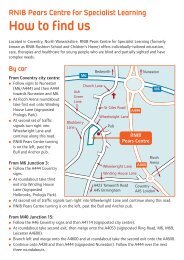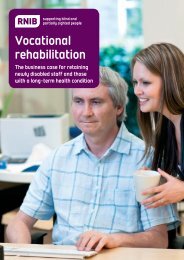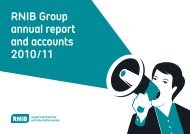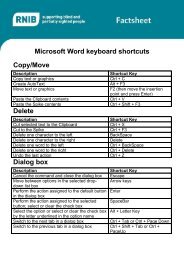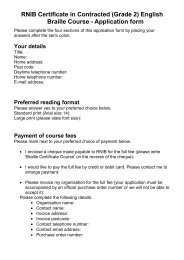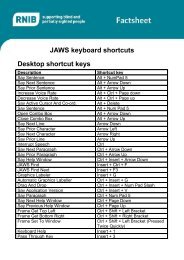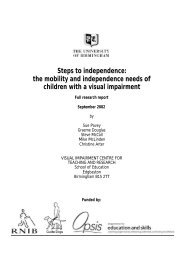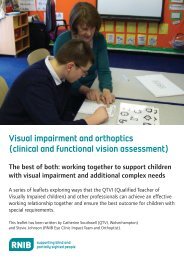RNIB NI's Looking Ahead, A Parent's Guide (PDF, 560kb)
RNIB NI's Looking Ahead, A Parent's Guide (PDF, 560kb)
RNIB NI's Looking Ahead, A Parent's Guide (PDF, 560kb)
Create successful ePaper yourself
Turn your PDF publications into a flip-book with our unique Google optimized e-Paper software.
Master <strong>RNIB</strong> Booklet_Layout 1 10/09/2012 15:10 Page 1<br />
LOOKING<br />
AHEAD<br />
A PARENT’S GUIDE<br />
For parents of children<br />
who are blind or<br />
partially sighted
Master <strong>RNIB</strong> Booklet_Layout 1 10/09/2012 15:10 Page 2
Master <strong>RNIB</strong> Booklet_Layout 1 10/09/2012 15:10 Page 1<br />
1<br />
Contents<br />
Introduction 02<br />
Coming to terms with 04<br />
your child’s sight loss<br />
What you can do 06<br />
Can anyone provide practical 09<br />
advice at the eye clinic?<br />
Family Support Officers 11<br />
Youth Service 14<br />
Angel Eyes Northern Ireland 16<br />
Early Years 18<br />
Going to School – who will help my child? 20<br />
Education Support 22<br />
Other Support Professionals 25<br />
Sensory Support Contact Details 30<br />
<strong>RNIB</strong> Library 32<br />
Jargon Busting 34<br />
Useful Contacts 39
Master <strong>RNIB</strong> Booklet_Layout 1 10/09/2012 15:10 Page 2<br />
2<br />
Introduction<br />
“<br />
When our child was diagnosed<br />
as having a life-long condition<br />
which would significantly<br />
affect her vision, our world<br />
suddenly changed. So many<br />
questions needed to be<br />
answered but it was difficult<br />
to know where to turn; who<br />
to turn to and what to ask.<br />
This statement is reflective of many parent’s<br />
reactions upon diagnosis. In producing this<br />
booklet, we hope to answer some common<br />
questions.
Master <strong>RNIB</strong> Booklet_Layout 1 10/09/2012 15:10 Page 3<br />
3<br />
We have attempted to set out a roadmap of<br />
services parents and children may encounter<br />
throughout their own personal journey. While not<br />
definitive, it provides information on statutory and<br />
voluntary services provided within Northern<br />
Ireland.<br />
Royal National Institute of Blind (<strong>RNIB</strong> NI)<br />
produced this booklet through funding allocated<br />
by the Health and Social Care Board in Northern<br />
Ireland.<br />
<strong>RNIB</strong> NI would like to thank The HSCB for their<br />
continued support.
Master <strong>RNIB</strong> Booklet_Layout 1 10/09/2012 15:10 Page 4<br />
4<br />
Coming to terms with your<br />
child’s sight loss<br />
First steps<br />
Finding out that your child has a sight problem<br />
can feel like a ride on an emotional roller coaster.<br />
There’s no “normal” response - different people<br />
respond in different ways.<br />
If your child has additional or complex needs and<br />
you discover he or she also has a sight problem,<br />
this can be especially hard to come to terms with.<br />
In addition to the joys and pleasures that your<br />
child gives you, at different times following<br />
diagnosis, you may feel disbelief, anger, sadness,<br />
worry and frustration. Different feelings come and<br />
go and sometimes catch up with you when you<br />
least expect it.
Master <strong>RNIB</strong> Booklet_Layout 1 10/09/2012 15:10 Page 5<br />
5<br />
All the while your child’s need for food, love,<br />
warmth and security continue to demand your<br />
energy, care and attention.<br />
When an older child loses their sight, it may take<br />
a long time to adjust. Remember that it’s possible<br />
to become independent again - you might like to<br />
talk to others about their experiences.<br />
Talking to friends or family can sometimes<br />
be a useful first step. There may also be a<br />
support group in your area. <strong>RNIB</strong>'s website<br />
(www.rnib.org.uk/northernireland) has a<br />
Parents' Place forum to talk to other parents<br />
in a similar situation.<br />
If your emotions are causing you difficulties<br />
in any way, contact <strong>RNIB</strong>'s Emotional<br />
Support Service, which offers confidential<br />
support, information and counselling.
Master <strong>RNIB</strong> Booklet_Layout 1 10/09/2012 15:10 Page 6<br />
6<br />
What you can do<br />
Get informed<br />
A good first step is to make sure you have access<br />
to the information and support that is available.<br />
This booklet will cover general information about<br />
all services and professionals you can expect to<br />
encounter on your, and your child’s, journey.<br />
Meeting and dealing with eye specialists<br />
Parents have told us that when visiting any<br />
specialist or doctor it is helpful to write down<br />
your questions before the appointment and to<br />
write the answers during the consultations -<br />
it is often difficult to retain everything said<br />
within a 10-15 minute appointment.<br />
Possible questions for the doctor, ophthalmologist<br />
or paediatrician<br />
• What is the condition called? Can you spell that<br />
for me?<br />
• What causes the condition? Please explain<br />
as simply as possible.
Master <strong>RNIB</strong> Booklet_Layout 1 10/09/2012 15:10 Page 7<br />
7<br />
• How does the condition affect my child’s ability<br />
to see?<br />
• Does this condition sometimes run in families?<br />
If so, can I speak to a genetic counsellor?<br />
• Can anything be done to cure or help this<br />
condition? Is any special treatment necessary?<br />
What might help? What can I do to help?<br />
• Is there anything my child mustn’t do<br />
(for example, rub their eyes, shake their<br />
head or jump on to a hard surface)?<br />
• Even with treatment, is the condition likely<br />
to get worse, get better or stay the same?<br />
• When should my child be examined again?<br />
• Where might we go for further advice and help?<br />
For example, could you give us the contact<br />
details for visual impairment professionals in<br />
social services, the education authority and<br />
voluntary organisations?<br />
• Is there anything further I can do to help<br />
my child?
Master <strong>RNIB</strong> Booklet_Layout 1 10/09/2012 15:10 Page 8<br />
8<br />
• Have you got any information on this subject<br />
that I can take home and read?<br />
• What can I do to encourage my child to help their<br />
vision develop, and to make the best use of their<br />
sight?<br />
• Can you refer my child to a Qualified Teacher<br />
of the Visually Impaired? I would like to discuss<br />
how my child’s sight might affect him/her at school<br />
or nursery, and what sort of support should be<br />
put in place.
Master <strong>RNIB</strong> Booklet_Layout 1 10/09/2012 15:10 Page 9<br />
9<br />
Can anyone provide practical<br />
advice at the eye clinic?<br />
Eye Care Liaison Officer (ECLO) service<br />
The ECLO service is present at the 12 main eye<br />
clinics throughout Northern Ireland. The hospital<br />
staff will normally refer a newly diagnosed person<br />
to the ECLO who is an immediate point of contact.<br />
<strong>RNIB</strong>, via the ECLOs, offer emotional and<br />
practical support. ECLO’s also receive referrals<br />
from optometry practices across NI, social<br />
workers and other sources including self referrals.<br />
The role of the Eye Care Liaison Officer<br />
is to provide:<br />
• Emotional support at point of diagnosis<br />
or any point thereafter.<br />
• Onward referral to other services<br />
(statutory and voluntary sectors).<br />
• Practical information and advice.
Master <strong>RNIB</strong> Booklet_Layout 1 10/09/2012 15:10 Page 10<br />
10<br />
If you wish to speak with an ECLO please contact:<br />
<strong>RNIB</strong> NI<br />
40 Linenhall Street<br />
Belfast<br />
BT2 8BA<br />
Tel: 028 9032 9373<br />
Email: ecloni@rnib.org.uk
Master <strong>RNIB</strong> Booklet_Layout 1 10/09/2012 15:10 Page 11<br />
11<br />
Family Support Officers<br />
The Wraparound Project in the Southern Health<br />
and Social Care (HSC) Trust area and the Family<br />
Support Service in the Northern HSC Trust area<br />
support children with disabilities, their families and<br />
the professionals involved through joined-up and<br />
multidisciplinary working. These projects seek to<br />
improve the quality and accessibility of services<br />
for children with sight problems (including those<br />
with additional difficulties) through the work of the<br />
Family Officers.<br />
• Information and Advice<br />
Give parents the information they need<br />
regarding sight loss.<br />
• Child and Family Events<br />
Work in partnership with Angel Eyes NI to<br />
arrange events for children and families to meet<br />
and share experiences in a relaxed and<br />
enjoyable way. These include family information<br />
weekends and fun days out.
Master <strong>RNIB</strong> Booklet_Layout 1 10/09/2012 15:10 Page 12<br />
12<br />
• Emotional support for Parents<br />
Provide emotional support for parents and<br />
opportunities for them to meet and talk.<br />
• Support for young people with sight loss<br />
Work with youth groups within <strong>RNIB</strong> NI and<br />
Wraparound, to ensure the voice of young<br />
people with sight loss is heard.<br />
• Referral to benefits advice services<br />
For more information contact:<br />
<strong>RNIB</strong> Northern Ireland<br />
40 Linenhall Street<br />
Belfast<br />
BT2 8BA<br />
Wraparound Family Officer<br />
Tel: 028 9032 9373<br />
Mobile: 079 3930 0949<br />
Northern Trust Family Officer<br />
Tel: 028 9032 9373<br />
Mobile: 077 7269 3446
Master <strong>RNIB</strong> Booklet_Layout 1 10/09/2012 15:10 Page 13<br />
13<br />
Email: childrenyouthni@rnib.org.uk<br />
Join us on Facebook:<br />
www.facebook.com/<strong>RNIB</strong>NorthernIreland<br />
<strong>RNIB</strong><br />
<strong>RNIB</strong> Northern Ireland and Isle of Man<br />
supports children and adults with sight<br />
loss to live full and independent lives.<br />
We provide a range of services for people<br />
living with sight loss, as well as walk-in<br />
resource centres.<br />
Our campaigning work aims to promote and<br />
improve the rights of blind and partially<br />
sighted people in Northern Ireland.
Master <strong>RNIB</strong> Booklet_Layout 1 10/09/2012 15:10 Page 14<br />
14<br />
Youth Service<br />
<strong>RNIB</strong> NI’s Youth Service is aimed at young<br />
people aged 4-25. We support young blind<br />
and partially sighted people to lead fulfilled<br />
and independent lives.<br />
Activities can include<br />
• Residentials<br />
• Day Events<br />
• Duke of Edinburgh Award<br />
• Weekly football club in Lisburn<br />
• Confidence building and assertiveness courses<br />
• Sport and leisure events<br />
• Taster sessions in the activity of your choice<br />
• Visual awareness training for your<br />
school/youth group/sports club<br />
For more information<br />
contact 028 9032 9373
Master <strong>RNIB</strong> Booklet_Layout 1 10/09/2012 15:10 Page 15<br />
15<br />
Share Holiday Village<br />
The Share Holiday village is an outdoor activity<br />
and adventure centre located on a 60 acre site<br />
on the tranquil shores of Upper Lough Erne.<br />
Share works for the inclusion of disabled and non<br />
disabled people by providing opportunities for all<br />
to participate in a wide range of activities such as<br />
canoeing, kayaking, orienteering, archery, banana<br />
skiing and laser combat fighting.<br />
<strong>RNIB</strong> NI owns a chalet at Share with en-suite<br />
bedrooms, central heating for year round use and<br />
comfort and a self catering kitchen. The Chalet<br />
can hold 12 - 14 people.<br />
The Chalet is available to rent and for<br />
more information please contact <strong>RNIB</strong> NI<br />
on 028 9032 9373.
Master <strong>RNIB</strong> Booklet_Layout 1 10/09/2012 15:10 Page 16<br />
16<br />
Angel Eyes Northern Ireland<br />
Angel Eyes NI is a charity that supports parents<br />
in Northern Ireland who have a blind or partially<br />
sighted child or children. Angel Eyes NI is a<br />
network of parents throughout Northern Ireland<br />
who support other parents, organise family days<br />
out and run education days.<br />
Angel Eyes NI run:<br />
• six family days per year<br />
• two Educational days for parents per year<br />
• provide an emotional support network<br />
for parents<br />
• refer onto other appropriate services<br />
and agencies<br />
• inform parents of types<br />
of services available<br />
to them
Master <strong>RNIB</strong> Booklet_Layout 1 10/09/2012 15:10 Page 17<br />
17<br />
The aim of Angel Eyes NI is to:<br />
1. Empower parents with information and support<br />
to help enable their children to fulfil their<br />
potential.<br />
2. Provide a unified voice for parents to influence<br />
service providers and ensure they reflect the<br />
needs of parents and children.<br />
Contact:<br />
Angel Eyes NI<br />
PO Box 1219<br />
Belfast, BT4 9DB<br />
Tel: 028 9076 0163<br />
Mobile: 077 3505 9763/074 1148 8897<br />
www.angeleyesni.org<br />
www.facebook.com/pages/Angel-Eyes-NI
Master <strong>RNIB</strong> Booklet_Layout 1 10/09/2012 15:10 Page 18<br />
18<br />
Early Years<br />
There are many things parents can do to help a<br />
child with sight loss learn more about the world<br />
around them.<br />
• Use a wide range of voice tones, inflections, and<br />
volume and talk to your baby during feeding,<br />
dressing, or changing.<br />
• Be specific when talking to your baby so he/she<br />
begins to develop a sense of the variety of<br />
words.<br />
• Encourage your baby to explore objects with her<br />
or his hands and learn the feel of different<br />
textures, such as a wet/dry washcloth, different<br />
articles of clothing, or food tastes and textures.<br />
• Involve your baby, even when very young, in<br />
things you do around the house. Describe what<br />
you are doing, such as setting the table, so<br />
he/she begins to make associations.
Master <strong>RNIB</strong> Booklet_Layout 1 10/09/2012 15:10 Page 19<br />
19<br />
• When you want to show your baby something,<br />
try to relate it to what he/she knows.<br />
• Give your baby hands-on experiences.<br />
• Look for places to take your child that have<br />
things to touch. If you have other children,<br />
make sure they are part of the experience, too.<br />
Resource Centre<br />
Products at <strong>RNIB</strong> <strong>NI's</strong> resource centre are<br />
especially designed to assist blind and<br />
partially sighted people with everyday living<br />
tasks that can be simplified or made more<br />
accessible. The product list also includes a<br />
large selection of early years toys and<br />
games for young children.<br />
Resource Centre enquiries and orders:<br />
Email: resourcecentre.belfast@rnib.org.uk<br />
Tel: 028 9032 9373
Master <strong>RNIB</strong> Booklet_Layout 1 10/09/2012 15:10 Page 20<br />
20<br />
Going to School<br />
– who will help my child?<br />
It may be the case that when your child is about<br />
to go to school, he/she may need help beyond<br />
what their teachers will be able to provide.<br />
A Statement of Special Educational Needs<br />
will identify what your child’s needs are and<br />
what additional help they might need.<br />
The Special Educational Needs Advice Centre<br />
(SENAC) provides an independent advice,<br />
information and advocacy service for parents<br />
of children and young people with special<br />
educational needs. This service is available for<br />
young people up to the age of 19, across a wide<br />
range of learning difficulties/disabilities.<br />
What is a Statement?<br />
A statement of special educational needs<br />
(SEN) sets out your child’s needs and the<br />
help they should have. It is reviewed annually<br />
to ensure that any extra support given continues<br />
to meet your child’s needs.
Master <strong>RNIB</strong> Booklet_Layout 1 10/09/2012 15:10 Page 21<br />
21<br />
How are statements given?<br />
Your child’s Statement of Educational Needs will be<br />
carried out by your local Educational and Library Board<br />
(ELB). Ask for a Statutory Assessment if you believe:<br />
• your child (under school age) will need extra<br />
help or special provision when they start school.<br />
• your school age child has a learning difficulty or a<br />
disability which is holding them back at school and<br />
• the school is unable to provide the help your<br />
child needs.<br />
If an assessment is necessary, the ELB will<br />
then seek the views of:<br />
• you and your child<br />
• your child’s school<br />
• an educational psychologist<br />
• a doctor<br />
• social services (if your child is known to them)<br />
The ELB board must check your child’s progress at<br />
least once a year after a statement is made. This<br />
annual review includes a meeting with parents, who<br />
can take a friend or adviser with them if they want to.
Master <strong>RNIB</strong> Booklet_Layout 1 10/09/2012 15:10 Page 22<br />
22<br />
Education Support<br />
Qualified Teacher for the Visually<br />
Impaired (QTVI)<br />
QTVI is a specialist teacher who provides advice<br />
and support to children and young people who are<br />
blind or partially sighted, their families, schools<br />
and other relevant professionals. The QTVI<br />
assesses each child’s functional vision and<br />
provides information and advice about specific<br />
eye conditions and the educational implications<br />
for learning.<br />
Advice and training is also given by the QTVI to<br />
school staff to ensure children have access to the<br />
curriculum, and that they are appropriately<br />
supported within the classroom and school<br />
environment.<br />
The QTVI works in partnership with schools to<br />
ensure that the needs of pupils with sight loss are<br />
fully met. The aim of the support provided is to<br />
enable pupils to fulfil their potential whilst at the<br />
same time developing and fostering
Master <strong>RNIB</strong> Booklet_Layout 1 10/09/2012 15:10 Page 23<br />
23<br />
independence. The range of support<br />
available includes:<br />
• Advice on the provision of adapted materials<br />
in the appropriate format, as necessary<br />
• Advice on curriculum access strategies<br />
• Provision of in-service training for school staff<br />
• Provision of specialist equipment and training<br />
in its use<br />
• Teaching in specialist curriculum areas as<br />
necessary e.g. braille, ICT;<br />
• Advice regarding special consideration/<br />
arrangements for examinations or assessment<br />
procedures<br />
• Awareness raising for peers<br />
• Advice regarding transition planning; work<br />
experience placements; career options through<br />
attendance at Annual Review/ Transition planning<br />
meetings and liaison with school staff, SENCo,<br />
Transition coordinator/Officer, Careers Adviser<br />
and other external agencies as appropriate.
Master <strong>RNIB</strong> Booklet_Layout 1 10/09/2012 15:10 Page 24<br />
24<br />
Technology Loan Library<br />
The QTVI can apply on behalf of a student, to<br />
borrow selected specialist technology from the<br />
Technology Loan Library. This is located at the<br />
Regional Vision Resource Base and was<br />
donated by <strong>RNIB</strong> NI. This technology is<br />
available for trial by the student for a school<br />
term, after which the Education Board will<br />
make an informed decision regarding the<br />
purchase of this specialist technology for the<br />
student concerned.
Master <strong>RNIB</strong> Booklet_Layout 1 10/09/2012 15:10 Page 25<br />
25<br />
Other Support Professionals<br />
Why do children with sight loss often have<br />
a Social Worker?<br />
Social Workers have a legal requirement to assess<br />
the needs of children who may need extra help due<br />
to their eye condition. The assessment, normally<br />
completed with parental consent, will look at the<br />
impact any visual difficulties may have on your child<br />
and the immediate family. This includes personal<br />
development, social experiences, self esteem and<br />
many other aspects of their environment and<br />
supports available. The assessment covers such<br />
topics as Mobility, Personal Care Skills, Daily<br />
Living Skills and Communication. The result of the<br />
assessment will be that the Social Worker will<br />
discuss with you, and your child, how these needs<br />
can be met before agreeing what to do.<br />
Once this assessment has been carried out,<br />
Specialist Social Workers can also provide<br />
specialist support and advice to the children,<br />
family members and other organisations who<br />
are working with a young person with sight loss.
Master <strong>RNIB</strong> Booklet_Layout 1 10/09/2012 15:10 Page 26<br />
26<br />
The UNOCINI Assessment Framework -<br />
Understanding the Needs of Children in<br />
Northern Ireland<br />
Social Workers in NI follow the guidelines of a<br />
framework known as the UNOCINI Assessment<br />
Framework.<br />
This is a method of assessing the needs of a child<br />
or young person. Anyone, in any agency, is<br />
encouraged to use the same form to note down<br />
the needs of a child, and hopefully meet them<br />
itself. If the child’s needs are such that they can<br />
only be met through the Health and Social Care<br />
Trust, the form will then be sent to the local Health<br />
and Social Care Trust to refer a child for further<br />
assessment and support or services that can only<br />
be reached through the Trust.<br />
Once the referral form has been received by the<br />
Trust, further assessment of the child’s needs is<br />
carried out. The assessment process is designed<br />
to look at all aspects of the child’s life. It helps<br />
agencies communicate with each other about<br />
children’s needs.
Master <strong>RNIB</strong> Booklet_Layout 1 10/09/2012 15:10 Page 27<br />
27<br />
Carers<br />
The definition of a carer:<br />
“<br />
Carers are people who, without<br />
payment, provide help and support<br />
to a family member or friend<br />
who may not be able to manage<br />
without this help because of frailty,<br />
illness or disability. Carers can<br />
be adults caring for other adults,<br />
parents caring for ill or disabled<br />
children or young people who<br />
care for another family member.<br />
Carers have the legal right to a separate and<br />
independent assessment of their own needs.<br />
Trusts can provide services that will enable<br />
carers to continue in their caring role.<br />
This may mean respite/short breaks<br />
and support services provided both<br />
within the home and elsewhere.
Master <strong>RNIB</strong> Booklet_Layout 1 10/09/2012 15:10 Page 28<br />
28<br />
Rehabilitation Workers<br />
Rehabilitation is a process that aims to help a<br />
blind or partially sighted person to achieve the<br />
best possible level of independence.<br />
Rehabilitation Workers for blind and partially<br />
sighted people are employed by local social<br />
services departments. They assess the individual<br />
needs of each blind or partially sighted person<br />
and can provide the following services.<br />
• Explanation of the person’s visual condition<br />
• If appropriate, assistance in the process of<br />
Registration as Blind or Partially sighted and<br />
help to obtain the associated concessions.<br />
• Advice about daily living activities, mobility,<br />
communication (reading, writing, telephone and<br />
computer), recreational and social activities.<br />
• Advice about useful services such as talking<br />
books/newspapers or Community Transport<br />
Schemes.
Master <strong>RNIB</strong> Booklet_Layout 1 10/09/2012 15:10 Page 29<br />
29<br />
• Assessment for magnifying aids.<br />
• Advice and support regarding school or employment.<br />
• Advice on minimising the risk associated with<br />
impaired vision at home, outdoors and school<br />
or work.<br />
• Issue of helpful items of equipment.<br />
• If agreed, referral to other agencies who can<br />
help provide help and support such as Social<br />
Worker, Occupational Therapy, NI Housing<br />
Executive, <strong>RNIB</strong> NI or local group for blind<br />
or partially sighted people.<br />
• If appropriate, rehabilitation training will be offered in:<br />
• Activities of daily living, including kitchen skills<br />
• Mobility skills<br />
• Communication skills
Master <strong>RNIB</strong> Booklet_Layout 1 10/09/2012 15:10 Page 30<br />
30<br />
Sensory Support Contact Details<br />
Belfast Trust Area Northern Trust Area<br />
Tel: 028 9504 9200 Tel: 028 7936 5018<br />
Western Trust Area<br />
Londonderry, Limavady, Dungiven & Strabane<br />
Tel: 028 7132 0167<br />
Omagh, Castlederg, Enniskillen and Fermanagh<br />
Tel: 028 6632 4400<br />
Southern Trust Area<br />
Craigavon and Banbridge, South Down<br />
and East of the Newry canal<br />
Tel: 028 3839 4088<br />
Minicom: 028 3839 4738<br />
Mobile: 078 3492 9124<br />
Armagh and Dungannon, South Armagh<br />
and West of the Newry canal<br />
Tel: 028 3741 2364<br />
Minicom: 028 3741 2421<br />
Mobile: 079 1910 3501
Master <strong>RNIB</strong> Booklet_Layout 1 10/09/2012 15:10 Page 31<br />
31<br />
South Eastern Trust Area<br />
North Down and Ards<br />
Tel: 028 9051 0136<br />
Minicom: 028 9151 0137<br />
Mobile: 077 3987 9556<br />
Lisburn<br />
Tel: 028 9260 7746<br />
Minicom: 028 9260 3120<br />
Mobile: 077 3987 9554<br />
Down<br />
Tel: 028 4461 6915<br />
Minicom: 028 4461 4744<br />
Mobile: 077 3987 9556
Master <strong>RNIB</strong> Booklet_Layout 1 10/09/2012 15:10 Page 32<br />
32<br />
<strong>RNIB</strong> Library<br />
<strong>RNIB</strong> have the largest specialised library in the<br />
UK for people with sight loss. The library provides<br />
the same kind of books you would expect to find<br />
in your local library. Anyone with sight loss (or an<br />
individual acting on behalf of someone with sight<br />
loss) can join the library.<br />
Cost<br />
Good news - <strong>RNIB</strong>’s library is free to join.<br />
Borrowing and choosing books<br />
Choose from the library catalogue and borrow six<br />
books at a time. The loan period is three months<br />
(no limit for talking books) and postage is free. To<br />
get an idea of available books, you can browse<br />
book lists on our website
Master <strong>RNIB</strong> Booklet_Layout 1 10/09/2012 15:10 Page 33<br />
33<br />
Formats<br />
There is a wide range of braille books, Giant print<br />
books and Moon books as well as a great<br />
selection of books for children and young people.<br />
braille music is also available and an online<br />
reference library including newspapers,<br />
dictionaries and encyclopaedia.<br />
Contact<br />
Telephone: 0845 702 3153<br />
Email: library@rnib.org.uk<br />
Website: www.rnib.org.uk
Master <strong>RNIB</strong> Booklet_Layout 1 10/09/2012 15:10 Page 34<br />
34<br />
Jargon Busting<br />
This information may help you to put complex<br />
visual jargon and measurements into more<br />
manageable terms.<br />
Accommodation is the process by which the<br />
optical power to maintain a clear image on an<br />
object as it draws near the eye. The eyes ability<br />
to accommodate gradually reduces over time.<br />
Amblyopia is the term used for a ‘lazy eye’.<br />
It is an eye that has more reduced or poorer<br />
vision than the other. Usually an amblyopic eye<br />
is a healthy eye that cannot be corrected with<br />
glasses (to achieve a ‘normal level’ of vision)<br />
due to poor development. Quite often a child<br />
with amblyopia or a lazy eye has or can<br />
develop a ‘strabismus’ or squint.<br />
Astigmatism usually means that the front<br />
surface of the eye is shaped like a rugby ball.<br />
It is very common in both persons with normal<br />
vision and those with impaired vision.
Master <strong>RNIB</strong> Booklet_Layout 1 10/09/2012 15:10 Page 35<br />
35<br />
Contrast Sensitivity is the direct comparison<br />
of one object’s colour or intensity to another<br />
i.e. a letter chart with black letters on a white<br />
background. Parents can sometimes wear bright<br />
distinctive clothing, making it easier for their child<br />
to pick them out from a crowd.<br />
Electrophysiology measures the amount of<br />
electrical activity along the visual pathway. Skin<br />
sensors / electrodes are placed on the scalp or<br />
eyelid, and a flashing light or checkerboard<br />
pattern is shown to the individual. Brain or<br />
electrical activity is then recorded via the little<br />
sensors. This procedure is painless.<br />
Hypermetropia is a common sight problem that<br />
affects someone’s ability to see close-up objects.<br />
Commonly known as long-sightedness,<br />
Myopia is short-sightedness, also known<br />
as near-sight.<br />
Nystagmus (dancing or wobbly eyes) is an<br />
involuntary flickering movement of the eyes,<br />
which makes fixation difficult and can reduce<br />
reading speed.
Master <strong>RNIB</strong> Booklet_Layout 1 10/09/2012 15:10 Page 36<br />
36<br />
An Ophthalmologist is a medical eye specialist<br />
or eye doctor who deals with diagnosis and the<br />
health of the eye, and child. They also can<br />
perform surgery and prescribe drug medication<br />
as necessary. The ophthalmologist has the ability<br />
to request registration for an individual as blind<br />
(severely sight impaired) or partially sighted<br />
(sight impaired).<br />
An Optometrist or Optician checks the child’s<br />
vision, prescribing glasses and low vision aids as<br />
necessary. An optometrist can also assess the<br />
health of the eye, make an initial diagnosis,<br />
manage some cases or refer a patient if<br />
necessary.<br />
An Orthoptist will look at the eye movements<br />
paying close attention to the eye muscles, and is<br />
mainly interested in binocular vision. Orthoptists<br />
are involved in the management of squints (were<br />
an eye turns in or out) or a lazy eye where the<br />
vision is poorer in that eye and patching (of<br />
the good eye) is some times indicated.<br />
They also assess any unusual head tilts<br />
associated with nystagmus.
Master <strong>RNIB</strong> Booklet_Layout 1 10/09/2012 15:10 Page 37<br />
37<br />
Refractive Error is the power or<br />
strength of corrective lenses / glasses<br />
necessary. This is measured using refraction<br />
or a retinoscope.<br />
Stereopsis is the ability to see in 3D. Some<br />
children who perform poorly in stereopsis tests<br />
may have poor depth perception.<br />
Strabismus is when one or both eyes turn in<br />
(Esotropia) or out (Exotropia). Orthoptists<br />
specialise with strabismus treatment.<br />
Vision is how well an individual can see, without<br />
glasses/ corrective lenses.<br />
Visual Acuity is how well an individual can see<br />
objects (letters/symbols) with glasses. This is<br />
measured during an eye test and is written as a<br />
figure called visual acuity (VA). For example if<br />
your child’s VA is 6/24; this means that the child<br />
needs to be 6 meters away from an object<br />
which a person with ‘normal vision’ can<br />
see at 24 metres.
Master <strong>RNIB</strong> Booklet_Layout 1 10/09/2012 15:10 Page 38<br />
38<br />
Visual Field is the extent of space in which<br />
objects are visible to an eye in a given position<br />
i.e. if you fixate on an object in this distance<br />
without moving your eye you are still able to see<br />
the surrounding landscape. This can be reduced<br />
in some individuals to almost a tunnel vision effect<br />
(like looking through cardboard tubes).<br />
A visual impairment is a term some people use<br />
to describe significant sight loss. It cannot be<br />
corrected with glasses. Glasses can improve the<br />
vision a little, taking pressure off the visual system<br />
and provide a clearer image.<br />
Visual Pathway is where light passes from the<br />
eye, through the retinal photoreceptors (rod and<br />
cone cells), along the optic nerves to the brain,<br />
were the picture is received / deciphered.<br />
V.I.Scotland<br />
VI Scotland has medical information about<br />
a number of eye conditions, aimed at parents.<br />
Their website address is:<br />
www.viscotland.org.uk/eyeconds/a-z.html
Master <strong>RNIB</strong> Booklet_Layout 1 10/09/2012 15:10 Page 39<br />
39<br />
Useful Contacts<br />
Albinism Fellowship<br />
Tel: 012 8277 1900<br />
www.albinism.org.uk<br />
Angel Eyes NI<br />
Tel: 028 9076 0163<br />
Mobile: 077 3505 9763/ 074 1148 8897<br />
www.angeleyesni.org<br />
Children’s Law Centre<br />
Tel: 028 9024 5704<br />
www.childrenslawcentre.org<br />
Contact a Family<br />
Tel: 028 9262 7552<br />
www.cafamily.org.uk<br />
Disability Sports NI<br />
Tel: 028 9038 7062<br />
www.dsni.co.uk<br />
Eyeless Trust<br />
Tel: 019 0385 7025<br />
www.eyeless.org.uk
Master <strong>RNIB</strong> Booklet_Layout 1 10/09/2012 15:10 Page 40<br />
40<br />
National Blind Children’s Society<br />
Tel: 012 7876 4764<br />
www.nbcs.org.uk<br />
Northern Ireland Commissioner<br />
for Children and Young People<br />
Tel: 028 9031 1616<br />
www.niccy.org<br />
Nystagmus Network<br />
Tel: 0845 634 2630 (UK only)<br />
Tel: 029 2045 4242<br />
www.nystagmusnet.org<br />
Special Educational<br />
Needs Advice Centre<br />
Tel advice line: 028 9079 5779<br />
Office: 028 9070 5654<br />
www.senac.co.uk<br />
The <strong>Guide</strong> Dogs for the<br />
Blind Association<br />
Tel: 0845 3727 402<br />
www.guidedogs.org.uk
Master <strong>RNIB</strong> Booklet_Layout 1 10/09/2012 15:10 Page 41
Master <strong>RNIB</strong> Booklet_Layout 1 10/09/2012 15:10 Page 42<br />
<strong>RNIB</strong> Northern Ireland<br />
40 Linenhall Street<br />
Belfast<br />
BT2 8BA<br />
Tel: 028 9032 9373<br />
Email: childrenyouthni@rnib.org.uk<br />
Web: www.rnib.org.uk/northernireland<br />
Facebook: www.facebook.com/<strong>RNIB</strong>NorthernIreland


